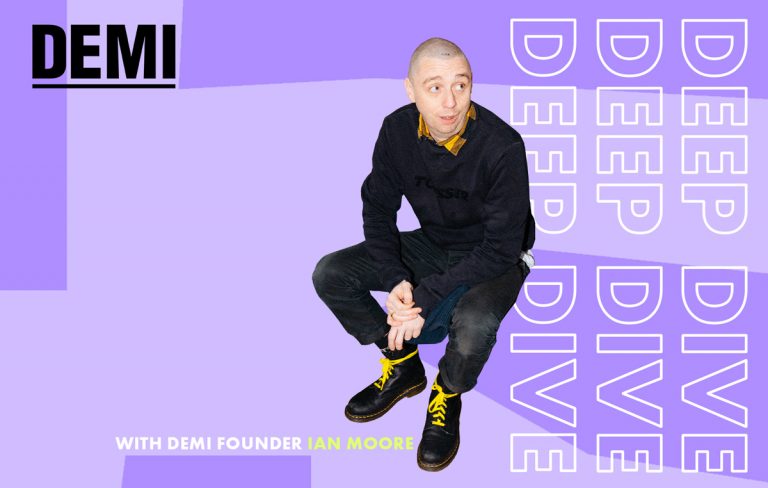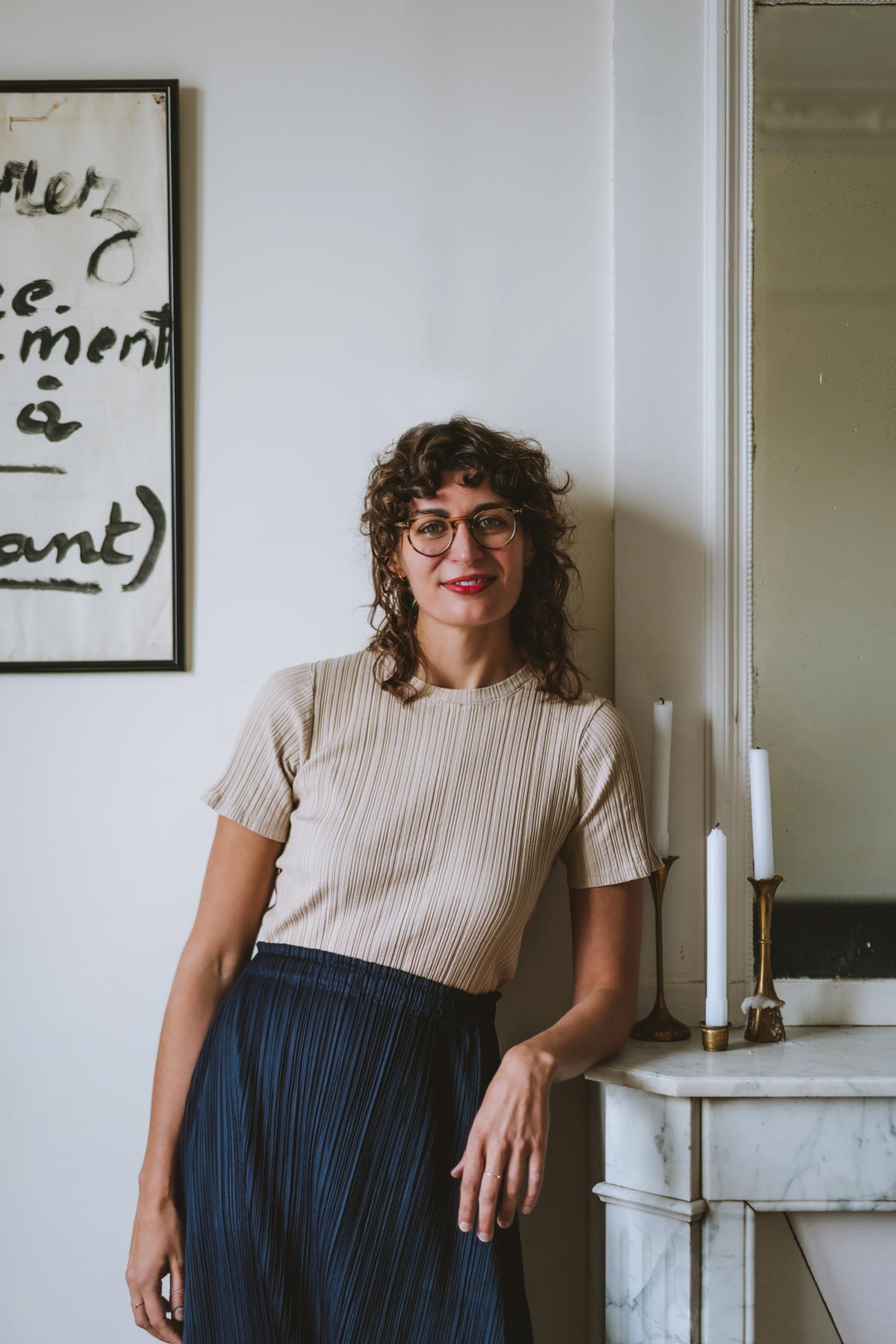The ‘OnlyFans of food’: DEMI’s CEO Ian Moore talks us through the future of the food industry

If you thought that OnlyFans was the ‘place to be’ for upcoming chefs looking to making a living during the COVID-19 pandemic, well, think again because DEMI is here to dethrone it. The platform, whose beta version was only launched in October 2020, allows subscribers to interact with and get cooking tips straight from their favourite chefs, who in return get paid for it. OnlyFans who, right? We spoke to DEMI’s CEO and founder Ian Moore to find out more about where the idea for the platform came from, how it’s giving back directly to its contributors, and what food enthusiasts should expect next from him.
A food enthusiast at heart
Although Moore had more than enough experience under his belt to cook up a concept as fresh as DEMI, it was his long-lasting love for food that initially led him to develop the platform’s concept. “When I was growing up in Ireland, I was already really into food,” he shared. “I would always search out for the weirdest things to eat. If there was something at the supermarket that would make the rest of my family go ‘ugh, that looks weird’, I would want to eat that—I just think it’s a cool way to experience stuff.”
As a teenager, Moore played in a punk band and whenever he would come off tour, he worked in kitchens, because “believe it or not, I didn’t make any money off punk music.” There, he met people as colourful as himself, that came from all walks of life, which led him to “always ending up working in kitchens.”
Moore continued to explore his passion for food through the media industry where he made a name for himself as Vice’s deputy managing editor first, leaving in 2015 to become LADbible’s creative director until February 2017. Shortly after that, he went on to become the COO of Empirical Spirits, the Copenhagen-based brainchild of Lars Williams and Mark Emil Hermansen, both alumni of Noma, also known as one of the world’s best restaurants. Let say this again: Moore had more than enough experience under his belt.
A pandemic-induced idea
As the world went into lockdown and restaurants, pubs, cafes—you name it—closed their doors indefinitely, the hospitality industry got put on hold, and so did its employees’ income. “I always knew I wanted to do something in food, didn’t know what I wanted to do, but at the start of the pandemic, I already knew I wanted to do something for a while. One day, it just clicked in my head, I thought, ‘shit, chefs work so hard, 18 to 20 hours a day, and they’re only filling the same amount of seats every time and it’s only the same amount of people that end up experiencing what they do every night’.”
Just like many of us, as the pandemic hit, Moore missed more than the actual food—he missed the people, the experience, the theatrics of it. “You know, when the chef comes down to your table and gives you this cool explanation of something, and it’s only 30 seconds but that’s hospitality, that interaction.”
As someone who regularly ranks the top five restaurants to go to first as soon as they reopen, I can relate to Moore’s longing for the community that makes the hospitality industry what it is to this day—the ‘vibe’, if you will. As Moore wondered about ways to scale that experience and connection beyond the four walls of a restaurant, he came up with DEMI’s blueprint, one that although highly needed during lockdown, could also stay relevant post-pandemic.
“I want to be part of a community where I learn from people that are passionate about the same things as me. That’s what social media was until they tried to ram stuff that I’m not asking for down my throat. I wanted to take social media back to the idea that it was, the fact that you can build small communities and bring people together through their values. People in the DEMI community are discussing socially-conscious stuff, what they’re fighting for or even their bloody pets—all sorts of topics. It’s not just discussing how to bake, it’s just that that subject brought them together,” explains Moore.
So what exactly do you get on DEMI?
According to its website, DEMI is “a platform that connects communities through food,” and it does so through two main elements: the DEMI communities and DEMI Love Letters. In December 2020, DEMI rolled out Love Letters on its platform, allowing anyone (users and non-users) to share personal and touching reviews of their favourite restaurants, cafes, bakeries and bars. The love letters, which can be about any place, anywhere in the world, range from short but sweet reviews to full-on, three-paragraph mini-essays, nurturing that same sense of community Moore mentioned previously.
“The Love Letters pretty much summed up everything that I wanted DEMI to be,” explains Moore, “I wanted it to be able to show just how important food is. We all ‘speak food’ you know, that’s something we all globally have in common, something that brings us together.”
While Love Letters are accessible to everyone through DEMI’s website, DEMI communities are where the membership comes in. For $10 a month, users gain access to six (and counting) different communities, which for now, come in the form of WhatsApp groups. Speaking to Thrillist, Moore said there is a global roster of “roughly 200 chefs that will host their own communities in the future.”
From Rebekah Peppler’s community, CLUB APÉRO, where members discuss the ins and outs of the French near-sacred ritual, and more, to Lucas Sin’s Chinese-ish Cooking Club, a group that focuses on applying generational knowledge of Chinese cuisine to whatever you’re cooking, the DEMI community is made up of an eclectic mix of chefs, food stylists, pastry chefs, culinary guides and wine connoisseurs.
It’s clear that comparing DEMI with a platform like OnlyFans has its flaws. First of all, one look at DEMI’s WhatsApp groups highlights the fact that interaction, collaboration and exchange are very much what makes them so fun. In comparison, even OnlyFans’ top content creators wouldn’t be able to reach that level of familiarity with their followers, simply because the platform’s model is not built for that.
Secondly, DEMI’s mission is to actually give back to its community’s hosts by redirecting all the memberships’ money directly to each contributor. How does that work exactly?
Sustaining DEMI
Moore’s idea for DEMI was not focused on its revenue potential, but I had to ask, how can a platform like this sustain itself if all of the money made from memberships goes directly to each community host? Was DEMI about to become the new DOJO?
“Right now we’re just giving all the money to the chefs and other hosts because we’re not providing any value as such—we’re just using WhatsApp chats. I wouldn’t feel comfortable taking a cut from the chefs’ money for literally putting them on a WhatsApp group,” Moore told me. But WhatsApp groups were only the testing part of DEMI’s platform. In less than a month, DEMI will have its own app, where hosts will have access to new tools created with them in mind.
“As soon as we have an app with specific tools made to actually help chefs monetise from their community and from their content—tools that we’ll build with them and that will bring data directly to them—then I think we’ll take about 15 per cent of revenues, which will cover transfer fees, platform fees, and people will have to get paid too. The hosts will get about 85 per cent of all the money made.”
DEMI’s impact on its hosts
Let’s be honest here, in our current society where most creatives get paid close to nada while only a few get paid for doing nada, DEMI sounds almost too good to be true. That’s why I also reached out to Rebekah Peppler, host of the CLUB APÉRO community, to hear what she had to say about DEMI and the different ways it helped her during the pandemic.

“When I got sick with COVID in early March 2020, I didn’t expect to devote a year to long COVID and put a near full stop on my work to focus on my recovery. And yet! While I did manage to hand in the final edits to my upcoming book À Table a few weeks into getting sick, I then basically laid in bed resting and storing up energy to do a patchwork of work with the express purpose of paying rent,” Peppler first told me.
“Because I was living alone for the bulk of this past year, I have a personal relationship with the deep levels of aloneness that I know so many are feeling right now. Because I’ve felt the risks so heavily, I am also hyper-conscious of the need to create a community in a safe yet meaningful way. My hope is that CLUB APÉRO exists as a space where anyone can feel the embrace of connection and communal apéro, even from the confines of their own home,” she added.
Speaking about the part that she plays in DEMI’s impressive journey so far, she said, “It’s always great to be part of the early stages of something you feel is special and has legs. The best part for me so far has been connecting with people in an online space that feels from the onset much more familiar and far less curated than Instagram. We’re sharing recipes we like, bottles we want to try, asking questions, and posting photos of our apéros all with the emphasis on what we’re drinking and eating, not with any superiority or how perfect it is, how well-lit, how organised the space around it looks, etc,” echoing Moore’s picture of a community where authentic interactions are its driving force.
And when it comes to receiving feedback from DEMI members, Peppler told me they pretty much agree with what the platform aims to be and do, “They mentioned how it feels almost like a new online experience. I fully agree—the community is beyond kind, supportive, and sincere. It’s been a way to create bonds and new friendships that could otherwise feel impossible to form during this time.”
So, while we await the reopening of our favourite places—and hopefully even after that—why not put our money where our mouth is and join DEMI’s community on its mission to get the movers and shakers of the food industry actually paid? I’ll be waiting for you on the CLUB APÉRO, ready to share all my French knowledge on the matter as well as to learn from others. Cheers!





